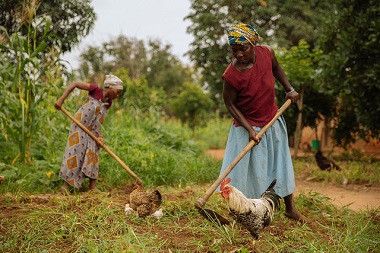Crops play a critical role in global food security as a source of food and feed. Every four years, the International Crop Science Congress hosts a forum for crop scientists from around the world to integrate current knowledge into a global context and international applications. On August 14-19, 2016, the Congress will hold its 7th meeting in Beijing, China, focusing on new technology and information that can help improve crop productivity in the context of climate change and water scarcity, fragile environmental resources, and conflicting demands on crop production and agriculture by diverse social systems.
IFPRI’s work has focused on building the evidence base for identifying new technologies and practices that can improve crop productivity. In South Asia, the Cereal Systems Initiative for South Asia (CSISA), a partnership between IFPRI, the International Maize and Wheat Improvement Center (CIMMYT), and the International Rice Research Institute (IRRI), was established in 2009 to strengthen and sustainably increase South Asia’s cereal-based cropping systems. One of CSISA’s interventions is the introduction of scale-appropriate agricultural machinery to conserve scarce resources and increase yields and profitability. To increase farmers’ access to these machines, CSISA has been promoting custom-hire services of various agricultural machines such as the laser land leveler (LLL), which helps improve water and fertilizer distribution. In 2013, IFPRI evaluated the impacts and potential incentive mechanisms to increase the use of LLLs in eastern Uttar Pradesh, India. The study found that the uniform subsidy across the state did not meet farmers’ needs; as a result, alternative strategies were presented to the state government to make the subsidies more efficient, encouraging more farmers to buy LLLs and rent them out. In addition, CSISA established networks of service providers for various agriculture machines in eastern India. From 2012 to 2015, CSISA has aided more than 1,900 farmers to become service providers in Bihar, eastern Uttar Pradesh, and Odisha, which helped thousands of small-scale farmers enhance their crop productivity. In fact, over 50,000 hectares of zero-tillage wheat were sown between 2013 and 2014 across Bihar and eastern Uttar Pradesh, a 42 percent increase from the previous year, partly due to the support of service providers.
Biotechnology, when combined with the science of breeding, creates improved crop varieties that can significantly increase crop production and ensure food security. IFPRI manages the Program on Biosafety Systems (PBS), which supports partner countries in Africa and Asia in the responsible development and use of biotechnology. Through the support of PBS, countries develop and implement functional and science-based biosafety systems that facilitate the development of resilient crops, contributing to stronger agricultural productivity. Today, smallholders in more than 15 countries successfully grow crop varieties developed through biotechnology. In Vietnam, PBS provided trainings and technical advisory services that contributed to the Vietnamese Ministry of Natural Resources and Environment’s approval of a double stack maize seed for commercial cultivation in the country in 2015. This new maize variety will help control the Asian corn borer—the most damaging corn pest in the Southeast Asian region—and aid farmers in managing weeds and maximize yield potential.
In 2014, IFPRI released a book, Food Security in a World of Natural Resource Scarcity: The Role of Agricultural Technologies, which examined 11 agricultural practices and technologies, and how these could help farmers sustainably grow three of the world’s main staple crops: maize, rice, and wheat. Significant findings from the book include: no-till farming could increase maize yields by 20 percent, and irrigating the same no-till fields could increase maize yields by 67 percent in 2050; efficiently using nitrogen could raise rice crop yields by 22 percent, and irrigation increased the yields by another 21 percent; and heat-tolerant varieties of wheat could raise crop yields by 17 percent, and with irrigation this crop could increase yields by 23 percent.
The IFPRI-led Agricultural Science and Technology Indicators (ASTI) program provides the only comprehensive and trusted source of information on developing country agricultural research and development (R&D) systems. ASTI has contributed to improving policymakers’ investment decisions and increasing crop productivity in many countries and regions. Most recently, the Inter-American Development Bank decided to use an ASTI-developed system of indicators as one of its decision tools to define priorities and address development challenges faced by the 26 country members in Latin America and the Caribbean.
Janna de la Paz is a Program Analyst at IFPRI.
For a downloadable PDF of this post, click the link to download or print this story. For more Outcome Stories, see the Outcome Stories blog.







